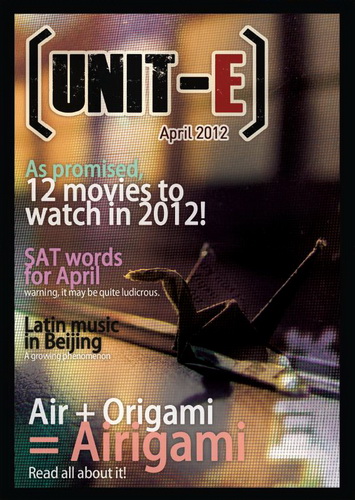 Living in the great metropolis that is Beijing, we may tend to overlook all of the resources we have at our disposal to experience foreign culture. Latin music and dance is one such type that has gained some attention in the city in recent years, and UNIT-E was fortunate enough to interview Mr. Luis Aguilar Garcia, who has the unique task of teaching Latin music at Beijing International Bilingual Academy (BIBA), about his appreciation of this art form as well as the Latin cultural scene in the city.
Living in the great metropolis that is Beijing, we may tend to overlook all of the resources we have at our disposal to experience foreign culture. Latin music and dance is one such type that has gained some attention in the city in recent years, and UNIT-E was fortunate enough to interview Mr. Luis Aguilar Garcia, who has the unique task of teaching Latin music at Beijing International Bilingual Academy (BIBA), about his appreciation of this art form as well as the Latin cultural scene in the city.
UNIT-E: What aspects of Latin music do you find most fascinating or appealing?
Mr. Luis Aguilar: The lively rhythm and the catchy lyrics that come with Latin music often generate a sense of joy and excitement when people listen to it. It’s fascinating that how this form of music puts a lot of emphasis on expressing emotion [more sporadically]rather than [in a stricter more conventional form].
UNIT-E: What methods do you use to teach Latin music to children and the public?
Mr. Luis Aguilar: My methods for children and adults are very similar, and the only difference is that many adults think that they don’t’ have musical or paying ability. But [the reality is that]most [adults]do, we must need to find the right instrument.
By comparison, children don’t know limitations. Everything is new and they want to try it, and so I focus on teaching them how to get a feel for the music first, and once they’ve “internalized” the music, I then proceed to determine which instrument is the most suitable for them to play, once they have an instrument that they like, I concentrate on improvising exercises that require them to have to come up with different ideas and rhythms every time the play. The more they know their instrument and how to play it, the more they understand and create the music. Latin music is about that: feeling.
UNIT-E: What type of atmosphere of Latin music or culture do you think exists in Beijing?
Mr. Luis Aguilar: Beijing has a lot of places that promote the Latin culture like restaurants, dancing clubs, and festivals. Chinese people are keen on learning about Latin culture because it is very similar to theirs. The two share many similarities, such as the emphasis placed on spending time with friends and family around the table, dedicating time for the members of the family on the weekends, etc. The food, music and language [of the Latin culture], including spicy Mexican food, Latin dance, like Salsa or Rumba, the Spanish language, and its songs and soap operas, are other aspects that attract a lot of people in Beijing towards learning about it and getting a first-hand experience.
UNIT-E: In the time that you have stayed in Beijing, do you feel as if this atmosphere has changed in any way?
Mr. Luis Aguilar: Yes, I do. The change has mainly been in the number of people who have expressed interest in learning the Spanish language, a number that has grown enormously. These people range from students at the main universities in Beijing to people who study the language out of curiosity and just as a side hobby.
Since Spanish is the second most spoken language around the world, the Mexican, Spanish, and Cuban embassies [in Beijing]frequently organize events, such as dinners and film festivals that aim to promote Latin culture in Beijing. The other thing I’ve notice is that back in 2006 there were only 2 Mexican restaurants in Beijing, now there are more than 11!
UNIT-E: What do you think are the best ways to enhance awareness of and appreciation of Latin music and culture?
Mr. Luis Aguilar: Fortunately, interest in and appreciation for Latin music and culture has spread not only in China but around the world due to its inherent “warmness” and promotion of a “happy spirit.” All this is thanks to modern Latin music, which has been around since the 1940’s and includes rhythms such as the Mambo, Rumba, Bossa Nova, Flamenco, Tango, Salsa, and Reggaeton. Many popular Latin artists, like Santana, Enrique Iglesias, Ricky Martin, and Shakira have also raised awareness of its [unique characteristics]. So the best way to promote Latin culture is through the language and the music! In Beijing there are also many clubs that have Salsa lessons and many gyms that offer Latin dance class.
As for myself, I not only participate in Latin music festivals in Beijing but also focus on promoting it through my music lessons at BIBA, where I have been given the opportunity to include this teaching as part of the daily music lessons. BIBA, as with all schools, wishes to provide the best education for its students, and since appreciation of music is a crucial step in enhancing the learning awareness of kids, teaching them about Latin music can truly help to improve children’s cultural awareness and also bring out their artistic and creative sides.
Amanda Song is a student at the International School of Beijing (ISB).
Nicole Ng is UNIT-e’s Head of Service. She can be contacted at nicoleng@unit-emagazine.org
About UNIT-E
UNIT-E was founded in the spring of 2010 with the aim of establishing a non-profit, student-run magazine for international students in Beijing. Staffed by current students from a range of international schools, the magazine provides an amalgam of cultural tidbits, fragments of Beijing student life, and a broad spectrum of unique perspectives from a diverse group of young adults.



